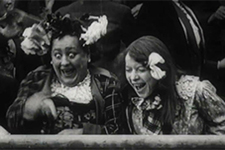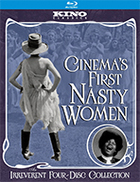Cinema's First Nasty Women
|  If you crack open a film history book—and there are many, many out there—you couldn’t be blamed for thinking that the early years of film history (or, really, most of film history) was the exclusive province of men. Male inventors, directors, cinematographers, exhibitors, and founders of production companies dominate the narrative of film’s nascent years in the late 19th and early 20th centuries, creating the illusion that women were all but absent outside of their appearances on screen. Kino Lorber’s superb new four-disc boxset Cinema’s First Nasty Women is another welcome antidote to this misleading narrative, centered as it is on the extensive contributions of women to the cinema’s first three decades—not just in front of the camera (although that is primarily what is highlighted here), but also behind the scenes. If you have seen Pamela Green’s excellent 2018 documentary Be Natural: The Story of Alice Guy-Blaché (and if you haven’t, you should), you know that female writers, producers, and directors were actually quite common in the early pioneering days of cinema, and it wasn’t until large financial institutions got involved in the 1920s that women were pushed to the margins. The women in Cinema’s First Nasty Women are the kind who refuse to be pushed to the margins. The set earns its intentionally provocative title, which is derived from the feminist movement that arose out of Donald Trump’s dismissive put-down of Hillary Clinton during a 2016 Presidential debate as a “nasty woman.” Like many a pejorative aimed at different groups, the term “nasty woman” was immediately appropriated as a badge of courage by women around the world, rewriting a derogatory slur into a celebration of rebellion against patriarchal structures of power and a refusal to go with the flow. The films in this box set are nothing if not a loud-and-proud celebration of unorthodox femininity and the long-standing tradition of women challenging, mocking, undermining, and kicking at the shins of the (male) powers that be. The films are many and varied—99, in fact, all produced between 1898 and 1926 in the United States, France, England, Italy, Denmark, and Sweden. Their compilation, which was done under the direction of Laura Horak, associate profess of Film Studies at Carleton University, and Maggie Hennefeld, associate professor of Cultural Studies and Comparative Literature at the University of Minnesota, was a labor of love meant to shine a light on forgotten faces, some of whom remain nameless to this day due to poor record keeping and the refusal of many early production companies to credit their actors. The films were sourced from more than a dozen international film archives and libraries, and many of them have not been seen in decades, which makes the set a genuine treasure trove of rarities and welcome rediscoveries. The emphasis on lesser known female performers means that many familiar faces from the silent era are conspicuously absent—you won’t find any films starring Sarah Bernhardt, Clara Bow, or Mary Pickford here (well, okay, Pickford does have a brief cameo in D.W. Griffith’s 1909 gastrointestinal farce Her First Biscuits, but she is hardly the star). What you will find instead is a dazzling array of unexpected delights that showcase the many, many ways that women can behave badly, whether it be dishonoring their husbands, organizing labor strikes, or rebelling against their domestic duties. The films run the gamut from slapstick farce, to melodrama, to action-adventure. There is literally something for everyone. The four discs, which contain roughly 14 hours of films, are organized around four themes: The first disc, “Disastrous Domestics & Anarchic Tomboys,” leans heavily on comedies involving wives and housemaids upending demure social conventions via cross-dressing, anarchy, and kitchen disasters. One of the highlights of this disc is the “Léontine” series of films produced by Pathé Comica between 1910 and 1912. There were some 22 films in the series made during those years, 15 of which are included here, although the tragedy remains that we still don’t know the name of the actress who played the eponymous adolescent prankster with a penchant for destruction. The majority of the films on the second disc, “Queens of Destruction,” feature one of three recurring French comedic characters: Cunégonde (Little Chrysia), Rosalie, and Pétronille (the latter two were both played by Sarah Duhamel). This disc also includes Fatty and Minnie He-Haw (1914), a two-reeler that pairs Roscoe “Fatty” Arbuckle with Minnie Devereaux, a Native American actress whose slapstick dexterity and memorable screen presence made her every bit Arbuckle’s equal. The third disc, “Gender Rebels,” is comprised primarily of films in which women disguise themselves as men or otherwise take on masculine roles, thus illustrating how the fluidity of gender is hardly a new concept. Most intriguing here are three films from “The Girl Spy” series starring Gene Gauntier, a prolific actress and screenwriter who penned more than 40 films, many of which she starred in. Like Florence Lawrence, Helen Holmes, Flora Finch, and Marion Leonard, she also founded her own production company, the short-lived Gene Gauntier Feature Players Company. And, finally, the fourth disc, “Female Tricksters,” which is the shortest of the four, again focuses heavily on cross-dressing, one of the most prominent and obvious visualization of gender transgression. There are some genuinely clever films in here, including The Boy Detective (1908), the first in a failed series featuring a young detective named Swipsey who impersonates a girl at one point in his detective work, only to be revealed at the end of the film as having been a girl all along. One of the most subversive films on the disc, Pranks (1909), directed by none other than D.W. Griffith (who has several films in the set), includes what the liner notes indicate is likely one of the oldest surviving depictions of a gay couple in an American film (swishy and stereotyped though it may be). The 99 films in the box set were culled from archives all over the world: EYE Filmmuseum, the Library of Congress, Jérome Seydoux Pathé Foundation, GP Archives, the British Film Institute, Blackhawk Films, the George Eastman Museum, the Library and Archives Canada, the National Library of Norway, the Swedish Film Institute, the San Francisco Silent Film Festival, the Museum of Modern Art, the Harvard Film Archive, and Princeton University Library. The oldest film in the set, the jokey, one-minute How Bridget Served the Salad Undressed from the American Mutoscope and Biograph Company, hails from 1898. The newest films are both two-reelers made in 1926: What’s the World Coming To?, which depicts a world 100 years in the future in which men act like women and women act like men, and She’s a Prince, a farce starring Parisian comedienne Alice Ardell as a woman going through a sorority initiation that goes all kinds of weird and wrong. In between those films is a wealth of gender-bending, anarchic, taboo-busting, wild-eyed hilarity that shines a light into corners of silent film history that have remained dark—or at least dim—for too long.
Copyright © 2023 James Kendrick Thoughts? E-mail James Kendrick All images copyright © Kino Lorber | ||||||||||||||||||||||||||||
Overall Rating: 


 (4)
(4)


